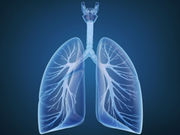Despite fewer symptoms than diagnosed patients, they use similar health services for exacerbations
FRIDAY, Aug. 12, 2016 (HealthDay News) — The overall health system burden of exacerbations in patients with undiagnosed chronic obstructive pulmonary disease (COPD) is considerable, according to a study published in the Aug. 1 issue of the American Journal of Respiratory and Critical Care Medicine.
Laura E. Labonte, from McGill University Health Centre in Canada, and colleagues compared exacerbation-like respiratory events, event prevalence, and the odds of using medication and/or health services in subjects with diagnosed and undiagnosed COPD who were participating in the CanCOLD (Canadian Cohort Obstructive Lung Disease) study.
The researchers found that there were 355 subjects with undiagnosed and 150 with diagnosed COPD. Those with undiagnosed disease were less symptomatic and had less functional impairment; they also had been prescribed fewer respiratory medications and had better health status. Diagnosed subjects had a higher incidence of reported exacerbation-like events. Severity of airflow obstruction was tied to incidence of exacerbation-like events in both groups. Though patients with diagnosed disease were more frequently prescribed medication for exacerbations, health service use for exacerbation events was similar in the two groups.
“Although patients with undiagnosed COPD experience fewer exacerbations than those with diagnosed COPD, they use a similar amount of health services for exacerbation events; thus, the overall health system burden of exacerbations in those with undiagnosed COPD is considerable,” the authors write.
Several authors disclosed financial ties to the pharmaceutical industry, and the CanCOLD study receives funding from pharmaceutical companies.
Full Text (subscription or payment may be required)
Copyright © 2016 HealthDay. All rights reserved.








